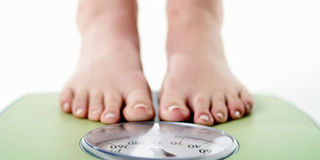Prime
Is age hindering my weight loss efforts?

Losing weight is not easy, especially if you have a lot of it to lose. COURTESY PHOTO
What you need to know:
- The weight gain experienced is usually around the abdomen and is mostly blamed on a fall in the female hormone oestrogen levels, age-related muscle loss and lack of exercise.
I am 56 years old and until recently, I weighed 59kgs. However, I now weigh 87kgs and although I have tried to lose the excess weight, it will not go. Why? Pelusi
Dear Pelusi,
At 56, it is likely that you have already stopped having periods (menopause). When a woman takes at least one year without having their periods, then that woman is said to have reached menopause. In Uganda, just as the rest of the world, the average age of menopause is about 50 years.
Much as many women about to reach or those who have reached menopause may experience the nasty symptoms including hot flashes, night sweats, sleep disturbances, mood changes and weight gain among others, some women may not.
The weight gain experienced is usually around the abdomen and is mostly blamed on a fall in the female hormone oestrogen levels, age-related muscle loss and lack of exercise.
Many women in menopause just as many others may prefer eating foods that are very sweet or fatty, hence contributing to weight gain after a woman has started menopause. One should, therefore, stop eating foods or eat them in moderation. These include cookies, pies, cakes, ice cream and alcohol, which only contains useless liquid calories.
Healthy eating is important because apart from contributing to proper health, this may give the body the much-required nutrients such as calcium and vitamin D to improve thinning of the bones that may accompany menopause together with the related unfortunate weight gain. This is apart from adding to the diet plenty of fruits, vegetables, whole grains and low-fat dairy products.
Regular physical exercise such as walking, dancing, aerobics and swimming at least 30 minutes every other day can also be a helpful addition for everyone in menopause, including those who require shedding extra weight.
If these do not help, one can discuss with their doctor whether they may need menopausal hormone treatment.
Will going to the sauna help me lose weight?
I have gained a lot of weight and because of this I use the sauna three times a week instead of exercising. Is going to the sauna effective as a weight loss strategy? Eryasi
Dear Eryasi,
A number of Ugandans wrongly believe that since going to the sauna makes one sweat, then it is equivalent to physical exercise in as far as managing weight is concerned. However, we sweat while exercising or using the sauna because both these activities make the body hot, therefore the need to sweat and then cool down.
Saunas neither burn fat nor help you burn calories just as physical exercise does. Therefore, going to the sauna will not help you achieve weight loss.
Not surprisingly, after going to saunas, many people feel hungry and end up eating fatty, oily and sugary foods. Because these foods increase the brain chemical serotonin, (the feel-good hormone), they will instead cause one to go to the sauna more often yet these feel-good foods will at the same time increase one’s weight.
Too much sweating in a hot sauna is partly responsible for craving something salty to replace lost salt due to sweating. Eating too much salt may cause high blood pressure, heart disease and stroke apart from weakening one’s bones since too much salt may cause too much calcium loss which calcium then will be pulled from the bones.
Whereas going to the sauna may have a few unsubstantiated benefits, going to the sauna more will not help you lose weight. It may instead cause more weight gain instead.
Why do I get a runny nose when it is cold?
Whenever it is cold or when I am about to have my period, I get a runny nose. I do not know why but what can I do to stop it? Jane
Dear Jane,
Many times, when a person gets a stuffy or runny nose apart from sneezing, a common cold tagged flu or a nasal allergy may be to blame.
Sometimes, blood vessels in the nose may expand and cause the same symptoms without the germs that cause the flu and when one has no allergy in what is called non-allergic rhinitis.
The triggers of this non-allergic rhinitis may vary from person to person and may include changes in temperature or humidity of the air, hormone changes say due to pregnancy, periods or birth control use.
The best way to prevent a runny nose from developing due to cold exposure is to avoid breathing in cold air. One way to do this is by covering the nose and mouth with a wrap or a mask while outdoors. This may be in addition to using salt nasal drops, prescription nasal sprays or the so-called decongestants.




